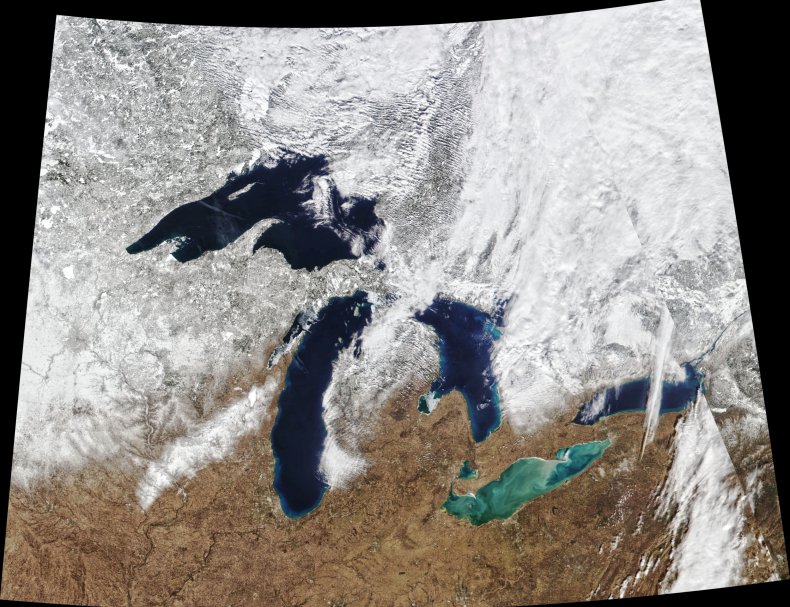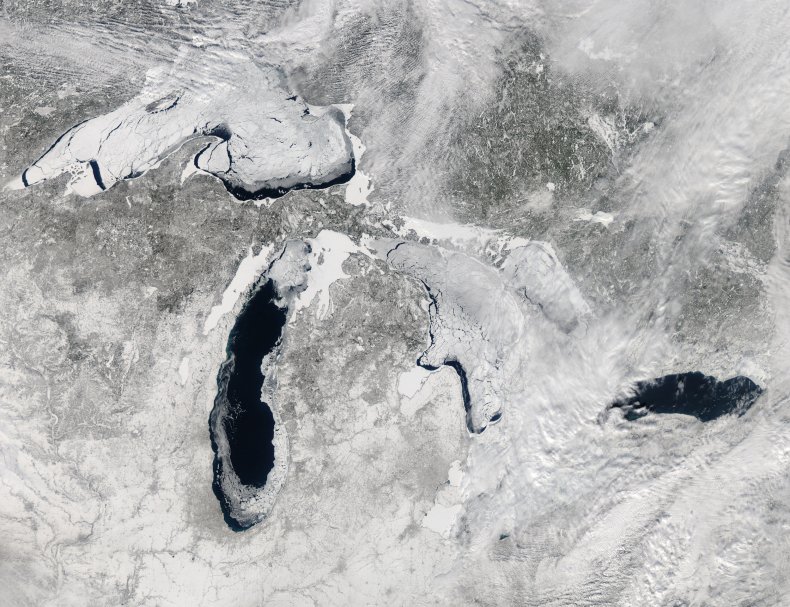Ice cover on the Great Lakes is at a record low for this time of year, as seen in pictures snapped from space by NOAA and NASA satellites.
Images taken by the Visible Infrared Imaging Radiometer Suite (VIIRS) on the NOAA-20 satellite on February 13 show the limited ice cover across the lakes, which were only 7 percent covered in ice. One day later, on February 14, 2023, the ice cover was only at 6.6 percent, which is the lowest ice cover measured on this date since satellite records began in 1973.
During mid-February, the average ice cover on the Great Lakes is between 35 and 40 percent, according to the National Oceanic and Atmospheric Administration's (NOAA) Great Lakes Environmental Research Laboratory (GLERL) data.



The Great Lakes include Superior, Michigan, Huron, Erie and Ontario. Lake Erie had a mere 0.7 percent ice cover on February 14, while Lake Huron had the most, measuring 11.7 percent cover.
Images taken by the Moderate Resolution Imaging Spectroradiometer (MODIS) on NASA's Aqua satellite nine years ago, on February 19, 2014, show the Great Lakes during a period of exceptional ice cover, with ice covering 80.3 percent of the lakes' surfaces.
It is thought that the exceptionally low ice cover this year is due to higher air temperatures in the Great Lakes region, which are a major driver of ice extent. According to the U.S. National Ice Center all five of the lakes had warmer than average air temperatures throughout January. Across the country as a whole, January 2023 was the sixth-warmest January on record, with an average temperature of 35.2 degrees Fahrenheit across the mainland U.S., NOAA data shows.
Ice cover on the #GreatLakes has dipped to a record low for this time of year, based on 51 years of Great Lakes ice data. As of Feb 12, the lakes currently have just 7.5% ice cover -- slightly below the previous low of 8.5% set in 2012, and well below the historic average of 41%. pic.twitter.com/4ybklRRMxj
— Great Lakes Ice Tracker (@glicetracker) February 13, 2023
University of Michigan climate researcher Richard Rood told The Washington Post that the ice cover of the lakes has been steadily declining for many years, scattered with the occasional year of higher ice cover due to colder air temperatures.
One study published by NOAA found that average ice cover on the Great Lakes during the period between December 1 to April 30 declined by 69 percent between 1973 and 2017.
Two years ago, the ice cover across the Lakes got even lower than this year, dropping to 1.3 percent on Jan. 17, 2021.
The main cause for this decreasing ice cover is natural patterns of climate variability over the Pacific and Atlantic oceans, according to Jia Wang, an ice climatologist at NOAA's GLERL and author of the ice cover study. This includes the North Atlantic Oscillation, the Atlantic Multidecadal Oscillation, the Pacific Decadal Oscillation, and the El Niño-Southern Oscillation.
"Each year we have to look at these four patterns to model ice cover," Wang told NASA Earth Observatory. "Right now, the Pacific Decadal Oscillation together with the North Atlantic Oscillation are causing warming in the Great Lakes."
While these are major drivers for the loss of ice in the Great Lakes, climate change is also expected to play a role in further reductions in ice at the Great Lakes and beyond over the coming years, according to one 2022 study published in the journal Nature Communications.
Do you have a tip on a science story that Newsweek should be covering? Do you have a question about ice cover in the Great Lakes? Let us know via science@newsweek.com.
Uncommon Knowledge
Newsweek is committed to challenging conventional wisdom and finding connections in the search for common ground.
Newsweek is committed to challenging conventional wisdom and finding connections in the search for common ground.
About the writer
Jess Thomson is a Newsweek Science Reporter based in London UK. Her focus is reporting on science, technology and healthcare. ... Read more
To read how Newsweek uses AI as a newsroom tool, Click here.








